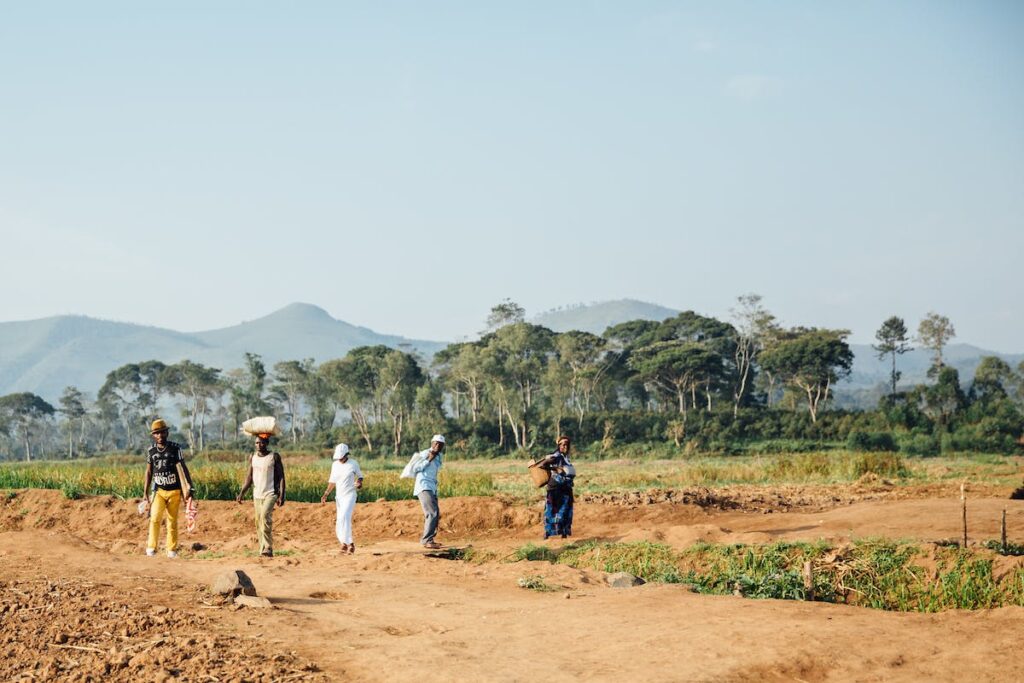Ildephonse tried to be a good neighbor, but he was frustrated. The 22-year-old married farmer was watching his crops wither for lack of irrigation. It was happening in his kitchen garden, adjacent to his home in Kala in the Democratic Republic of the Congo. There he grows a broad variety of crops to feed his household.
But the plants were dying even faster on the plot of land where he primarily raises onions and some garlic, which he then sells when the crops mature. It is his principal livelihood.
Irrigation Diversion Creates Conflict
What was upsetting Ildephonse most was that the plants were dying unnecessarily. Water was available, and he knew what was happening. His neighbor, Mapenzi, a 30-year-old married father of three, was diverting the water to his own land.
“We had all worked to create this small irrigation canal, which was to serve all the nearby neighbors and provide water for our onion fields,” Ildephonse explained. “Mapenzi had clearly directed the irrigation water toward his own field, while depriving me of it.
“I was not happy at all. If my crops died from lack of irrigation, we would suffer the loss for a full year. We got into a fight early that summer.”
He says he stopped speaking to his neighbor. And his crops continued to wither.
Improvements Were Underway
It was June 2017. Ildephonse was not aware that Food for the Hungry (FH) was beginning a project to benefit vulnerable households in his area, in the provinces of South Kivu and Tanganyika.
Called Tuendelee Pamoja II (“Moving Forward Together”), the USAID-funded matching grant project targeted irrigation and other agricultural needs specifically in his sector.
Ildephonse lives near the Kala river, which gives its name to his community in eastern DR Congo. It’s an area filled with flatlands dotted with marshes. The FH project was a major effort to use hydraulic systems to drain the previously unusable marshland. The reclaimed water was in turn used for irrigation, as part of the effort to modernize farming practices in the area.
A Play Plants the Seed
Ildephonse learned of the project at an FH-lead community gathering. The main attraction of the evening was a skit, presented by actors from the Kala community. It was called, ”Conflict between farmers linked to the misuse of water from irrigation.”

Ildephonse, of course, immediately recognized his own situation in the skit. It ended with another member of the audience taking the floor to suggest a solution.
“We as good neighbors must use the (irrigation) water in small quantities and share it in turns, instead of fighting,” said the other spectator. “Everyone needs their field to produce.”

Ildephonse said this proposed solution inspired him. “The next day, I went to my neighbor, Mapenzi, to try to make him understand how we must both use this water,” he said. “Fortunately, he agreed to my suggestion to take turns watering the plants in our fields.”
Peaceful Coexistence
The conflict between the two neighbors had lasted for more than two and a half years. But Ildephonse says he and Mapenzi have remained on good terms ever since adopting the solution. The FH project increased the amount of available water, and the two good neighbors and others near them continue to share it harmoniously today – and their fields have grown and flourished.

The successful project was an excellent example of how matching grant projects can make a huge difference for a whole community. The matching funds made the irrigation system possible, and FH’s work in the area helped farmers not only have continuing success through the completed project but also build resilience and learn to find their own solutions to conflicts.
Next Generation of Good Neighbors
Ildephonse and his wife now realize that another major benefit of the irrigation project was what the experience taught their children. Water conflicts in communities like theirs have sometimes become so heated that they have led to violence and even death.
Watching their parents work toward reconciliation set an excellent example for children and teens in the community. The peace that followed gave them a more stable childhood. But it also prepared them for adulthood, when they will be the ones managing water resources in their communities.
Becoming a Community Leader
Once Ildephonse saw the results of the compromise, he took the next step and volunteered to become a community volunteer. He now actively encourages community members to peacefully resolve many types of problems. This has reduced fighting in the community and has nearly eliminated conflicts that require intervention by local police.
Read More Posts:
The Gift of Clean Water Made Possible with Partnerships


